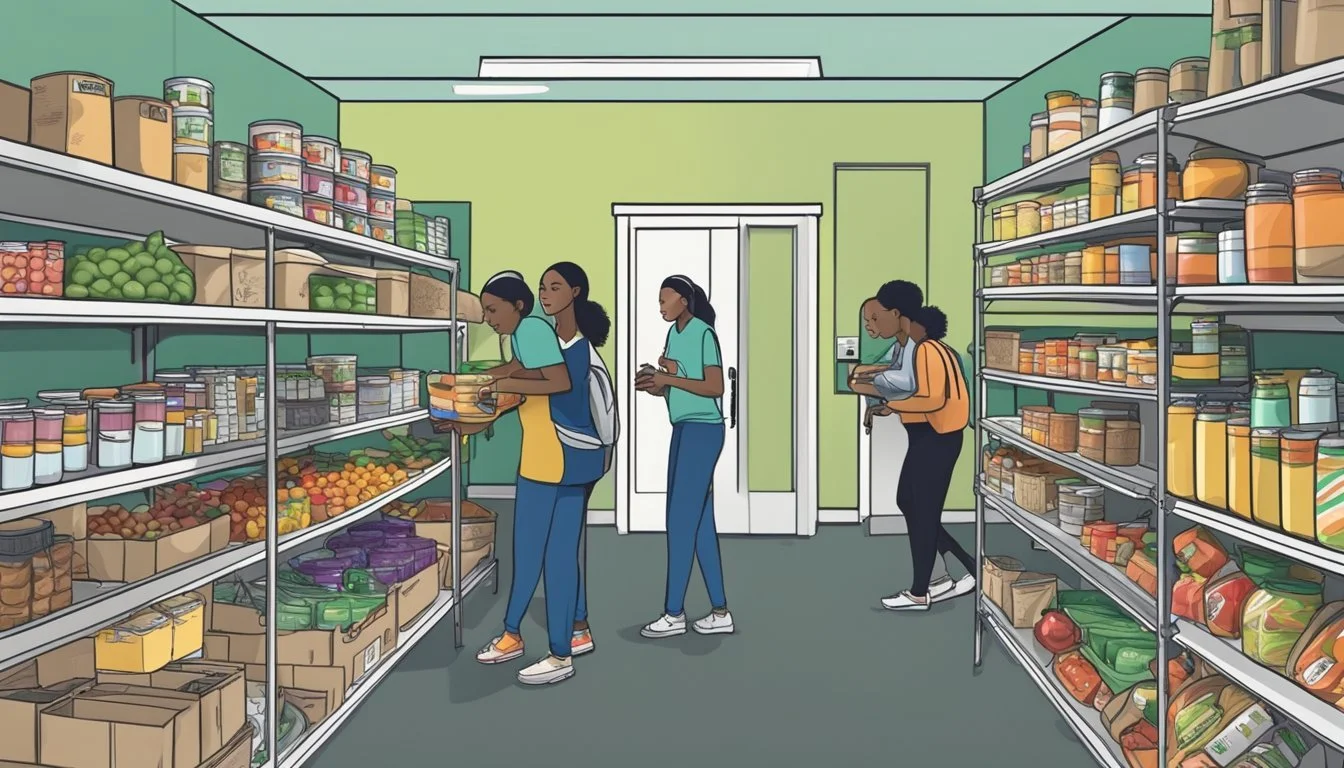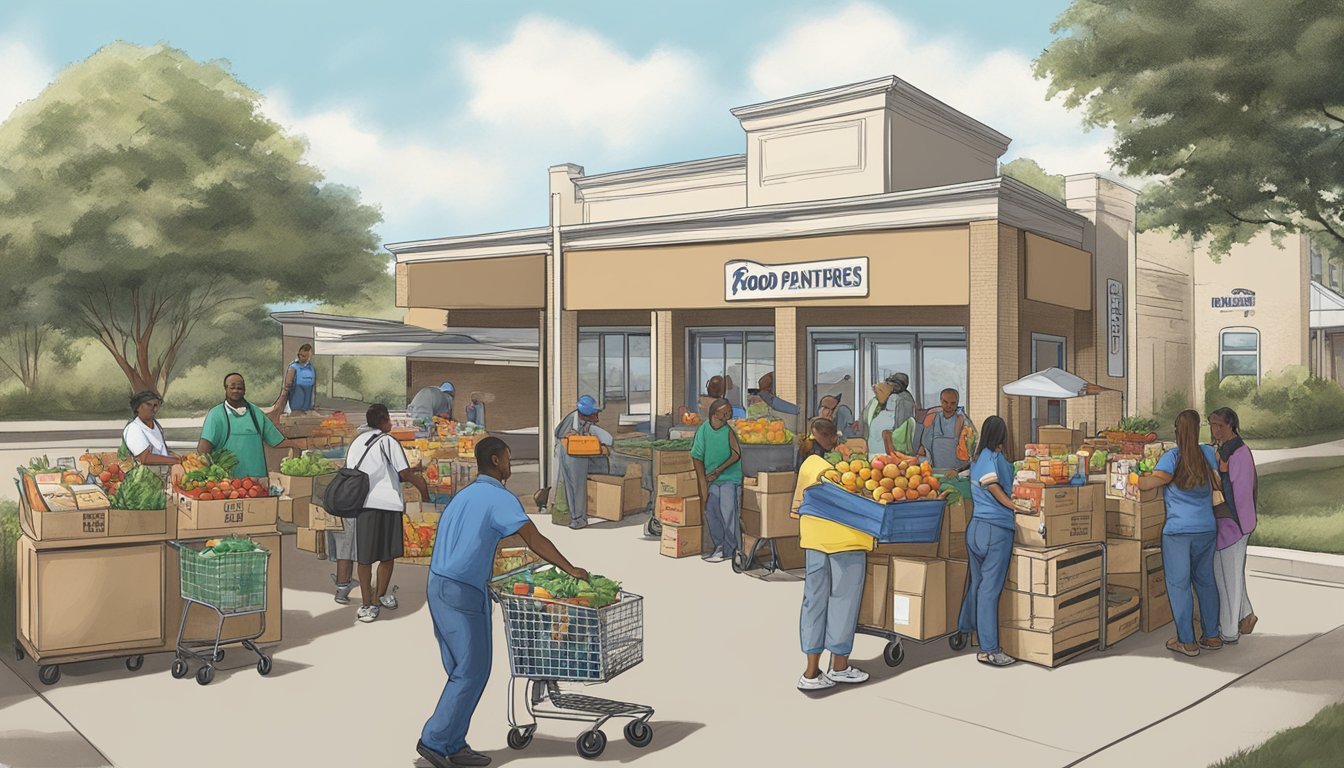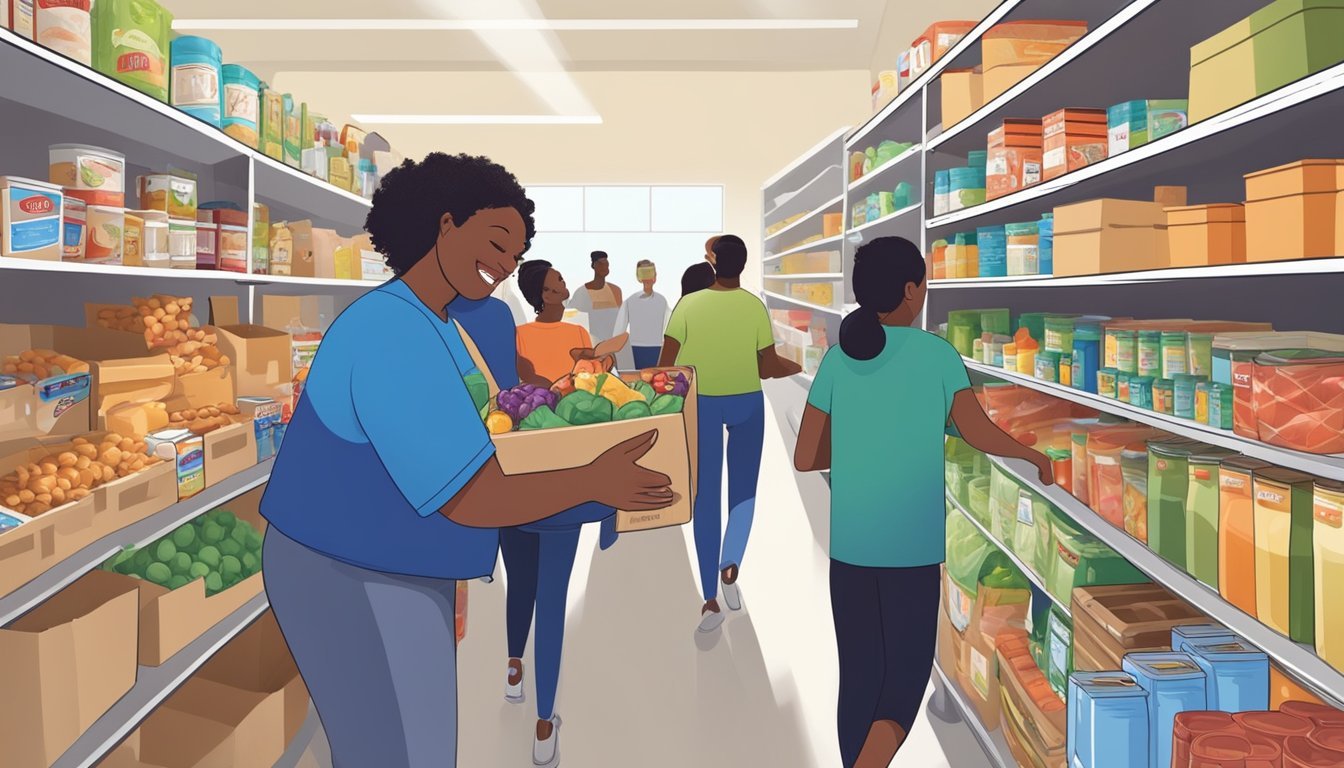Free Groceries and Food Pantries in Dallas County, Texas
Your Guide to Local Food Assistance Programs
This Article is Part of Our Guide on Free Groceries in Texas
In Dallas County, Texas, a robust network of food pantries provides essential support to residents in need. These pantries ensure that individuals and families facing food insecurity have access to free groceries and nutritious meals. The county's food assistance services play a pivotal role in nurturing the well-being of the community, especially amidst challenges such as economic downturns or health crises like the COVID-19 pandemic.
Food pantries across Dallas are crucial in upholding a safety net for many who find themselves in times of hardship. By obtaining necessary items such as fresh produce, canned goods, baby formula, and personal hygiene supplies, these food pantries mitigate the strain on households that struggle to meet their basic needs. In addition to supplying food, some centers offer help with applications for SNAP food stamps, further extending their support to ensure no resident goes without aid.
Operating on the principles of compassion and community support, food pantries in Dallas do not typically require proof of income, focusing rather on immediate assistance. With contact information commonly available through various channels, residents can easily find a helping hand nearby. These services underscore the sense of community resilience and collective responsibility within Dallas County.
Identifying Food Assistance Programs
Dallas County offers a variety of food assistance programs to support individuals and families in need. These programs include a network of food banks and pantries, federal benefit programs like SNAP and WIC, as well as soup kitchens providing immediate meal support.
Food Banks and How They Operate
Food banks in Dallas County are central facilities that store and distribute donated food to a network of food pantries and meal programs. They operate with the help of volunteers and community support. One such organization is the North Texas Food Bank (NTFB), which provides food assistance through a schedule of mobile food distributions and a locator tool to find nearby food pantries.
Food Pantries provide groceries directly to individuals and families.
Mobile Distributions take place across various locations, extending the reach.
Understanding SNAP and WIC Benefits
The Supplemental Nutrition Assistance Program (SNAP) and the Women, Infants, and Children (WIC) program offer nutritional assistance to eligible low-income individuals and families.
SNAP benefits can be used to purchase food at many grocery stores and markets.
WIC provides additional support for pregnant women, new mothers, and young children, focusing on healthful nutrition.
Both programs have eligibility requirements and offer different types of assistance, adapting to the changing needs post the COVID-19 public health emergency.
Utilizing Soup Kitchens
Soup kitchens are readily available resources in Dallas County for those in immediate need of a meal. They offer hot, prepared meals without the need for eligibility documentation or prior arrangements:
Accessibility is typically immediate, with locations throughout Dallas.
Meal Support comes with no cost to individuals seeking food.
Dallas County's food assistance ecosystem includes valuable resources for residents who require help with food security. Soup kitchens provide immediate relief, while food banks and benefits programs offer longer-term support.
Comprehensive Directory of Food Pantries
This section provides a curated list of food pantries offering free groceries within Dallas County, organized by location and service type, including mobile pantry details.
Dallas Central Food Pantry Locations
Smart Choices Texas
Address: Dallas, TX - 75240
Phone: (214) 937-9198
Services: Increases access to affordable, healthy food in under-served communities.
Richardson East Church of Christ
Address: Richardson, TX - 75081
Phone: (972) 231-8231
Services: Operates a food pantry serving the local community.
Food Pantries By Zip Code
Irving, TX Zip Codes: 75038, 75039, 75060, 75061, 75062, 75063
Phone: (972) 721-9181
Documentation: Photo ID, proof of family, and residence required.
Richardson, TX Zip Codes: 75080, 75081, 75082, 75083
Pantry Hours: Monday - Friday, 10:00am - 1:00pm
Phone: (972) 644-2335
Documentation: Valid picture ID required.
Mobile Pantry Information
Residents of Dallas County can benefit from mobile pantry services that provide accessible food assistance to various areas. For the latest schedules and locations, individuals should reach out directly to local food assistance organizations or visit their websites for updated details. Mobile pantry services are critical in reaching those who may not have easy access to fixed food pantry locations.
Eligibility and Access to Food Assistance
In Dallas County, Texas, food assistance is readily available for those in need. Eligibility is generally determined based on income and family composition, ensuring low-income families and individuals receive the aid they require.
Income-Based Assistance
Food assistance programs in Dallas County may use federal guidelines to determine eligibility based on household income. Federal programs such as the Supplemental Nutrition Assistance Program (SNAP) require applicants to meet specific income thresholds. These thresholds consider the number of individuals in a household, with the limits increasing proportionately with family size.
For Families: The size of a family impacts the maximum income level allowable for eligibility.
For Individuals: Single residents must also fall within income limits, which are typically lower than those for families.
Documentation to prove income status is often required when applying for these programs.
Eligibility for Families and Individuals
Both families and individuals seeking food assistance in Dallas County must meet certain criteria to qualify. Requirements may include:
Valid Identification: Photo ID or other forms of identification are generally needed.
Proof of Residence: Documentation like utility bills or a lease may be required to establish residency within the specified service areas.
No Income Proof Required: Some food pantry services may not require proof of household income, broadening the availability to those in varying financial situations.
Eligibility criteria can vary depending on the specific food assistance service, and some programs have recently adjusted requirements due to changes in federal guidelines following the COVID-19 public health emergency.
Specialized Support Services
In Dallas County, Texas, specialized support services are structured to cater to the varying needs of diverse populations, particularly focusing on the most vulnerable like seniors and disabled individuals, as well as children and students.
Assistance for Seniors and Disabled Individuals
Seniors and disabled individuals in Dallas County have access to dedicated support services addressing their unique nutritional needs. Centers specialize in easy-access grocery services, often providing delivery at no cost to remove mobility barriers. These services ensure that the elderly and disabled community members receive necessary food support in a manner that respects their mobility and health requirements.
Support Services for Children and Students
For children and students, Dallas County offers programs geared towards ensuring they receive adequate nutrition for effective learning and development. Many centers provide food assistance through programs that coincide with the school calendar, ensuring uninterrupted access to food during school hours and breaks. Such programs may include school-based food pantries and backpack programs that discreetly provide children and students with food to take home.
Community and Religious Organizations
In Dallas County, an array of community and religious organizations play a pivotal role in offering food assistance to those in need. These entities range from churches to non-profits, each providing resources like groceries and pantry items to alleviate hunger in local communities.
Churches Offering Food Assistance
Churches are often frontline responders to hunger in Dallas County, serving as vital food distribution points. Catholic Charities Dallas operates mobile community pantries that travel across the Diocese of Dallas. Families benefitting from government assistance programs are eligible to receive aid with no proof required. Additionally, St. Philip's partners with local entities to address hunger through Aunt Bette's Community Pantry, illustrating how religious institutions collaborate with food banks and other organizations.
Notable Church-Based Pantries:
Catholic Charities Dallas Mobile Pantries
St. Philip's and Aunt Bette's Community Pantry
Charities and Non-Profit Involvement
Charities and non-profits in Dallas County are key contributors to food justice and assistance. They utilize a network of food pantries and community outreaches to support residents. The North Texas Food Bank works with partners like St. Philip's to boost food distribution efforts. The Oak Cliff Veggie Project, initiated by residents Bettie and Ples Montgomery, exemplifies local non-profit efforts by regularly providing free vegetables to the Oak Cliff community.
Key Charity Initiatives:
North Texas Food Bank collaborations
Oak Cliff Veggie Project's community vegetable distribution
Operational Details of Food Assistance Providers
Food assistance providers in Dallas County offer vital services with specific operational hours and a structured agency network to facilitate access to free groceries for those in need.
Service Hours and Contact Information
Several food pantries serve Dallas residents, each with its own set of service hours. For instance, the North Texas Food Bank encourages individuals to contact an agency directly to confirm service hours. Residents can reach out for SNAP application assistance at 214-330-1396.
Dallas, TX Food Pantries Operational Hours:
Mondays: 9 AM - 1 PM
Wednesdays: 12 PM - 4 PM
Fridays: 10 AM - 2 PM
Contact information varies per pantry, and residents are suggested to verify the details on an agency’s website or by calling in advance to confirm availability.
Understanding the Agency Network
The food assistance network in Dallas consists of interconnected agencies that collectively support food security initiatives. These agencies range from local food pantries to federal program assistance such as SNAP. Each entity serves specific zip codes and populations, ensuring that assistance is efficiently distributed. Residents of Irving, TX, for example, are required to present valid photo identification, proof of family, and proof of residence, while income proof is not mandated for receiving aid from the pantry.
Nutritional Education and Additional Resources
Dallas County offers a range of educational programs and additional resources to enhance food security and ensure that individuals not only receive free groceries but also acquire knowledge on nutritional value and healthy eating habits.
Educational Programs and Workshops
These educational initiatives focus on the importance of nutrition, providing attendees with the knowledge needed to make better food choices. Workshops may cover topics such as meal planning, understanding food labels, and managing food budgets. They are essential services offered within the community to improve residents' long-term health outcomes. Many local food pantries partner with organizations to provide such educational benefits alongside their food assistance services.
Other Resources for Food Security
In addition to educational workshops, Dallas County residents can access various resources aimed at increasing food security:
Federal Assistance Programs: Residents may qualify for federal programs like SNAP, which can help them afford nutritious food.
Local Food Pantries: Various pantries across Dallas provide access to free groceries, fresh produce, and sometimes baby formula. Call ahead to centers to get detailed information on available services.
Healthy Food Access Programs: Organizations improve overall health by connecting individuals with healthy food options. These can include mobile pantries and farmer's markets accepting SNAP benefits.
Success Stories and Impact
The Dallas County area has observed tangible outcomes from the organizations aiming to combat food insecurity. Noteworthy ventures have paved the way for a thriving network of support, positively altering the lives of individuals and families.
Community Impact Stories
Oak Cliff Veggie Project: A community initiative born from the determination of a mother-and-son duo, Bettie and Ples Montgomery, has been consistently supplying free vegetables to local residents. They demonstrate the potential for small-scale projects to foster significant community well-being.
Salvation Army's Mobile Food Pantry: Operating within the 75235 zip code, the Salvation Army's efforts are in direct response to a staggering 17.90% food insecurity rate. Their mobile pantry exemplifies how immediate, mobile assistance can reach individuals in critical need, substantially reducing food scarcity incidents.
Improvements and Growth of Aid Programs
North Texas Food Bank (NTFB): As a key supplier for various food assistance initiatives, the NTFB has shown remarkable adaptability and growth, aiming to deliver over 345,000 meals through its channels, including new mobile pantries, reaching nearly 6,000 more individuals in the next three years.
Westside Food Bank's Success Stories: They encapsulate the transformative impact food aid can have. Through their network, individuals facing dire circumstances found relief and a chance to improve their life trajectories, standing as a testament to the extensive reach and positive ripple effect of well-structured aid programs.







